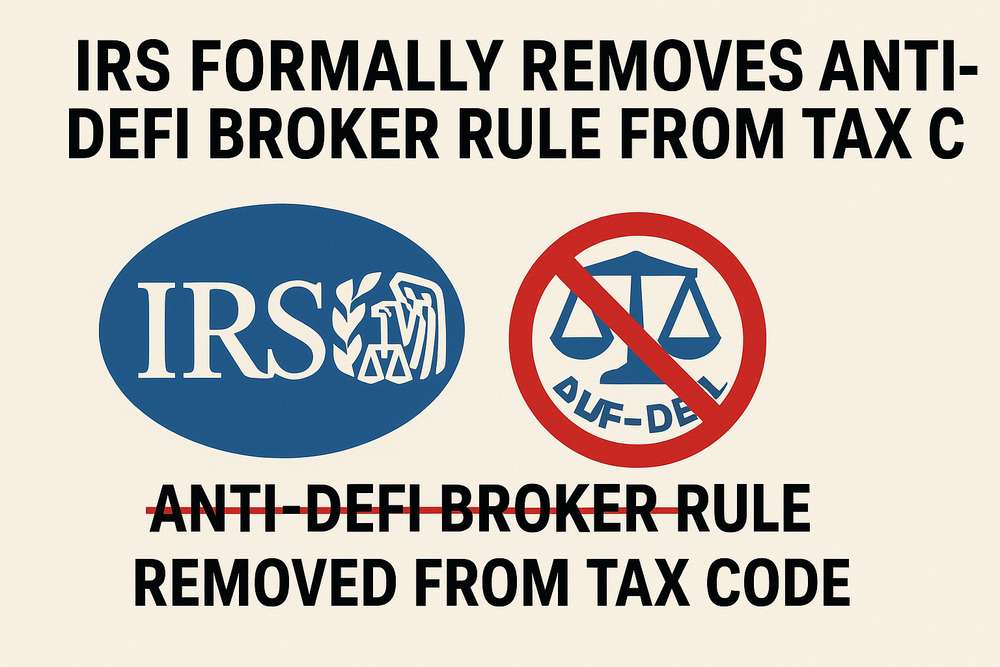The Inside Income Service (IRS) has formally eradicated controversial reporting necessities for decentralized finance (DeFi) platforms following bipartisan laws signed by President Trump. This transfer nullifies laws that might have compelled DeFi brokers to gather consumer info and file transaction reviews, marking a big shift in crypto tax coverage.
On April 10, 2025, President Trump enacted laws repealing Part 80603 of the Infrastructure Funding and Jobs Act (IIJA), which had imposed digital asset reporting obligations on DeFi platforms. The bipartisan invoice handed each chambers of Congress amid widespread business criticism that the foundations have been technologically unworkable and threatened innovation in decentralized finance.
The repealed laws would have required DeFi platforms—which function with out central intermediaries—to implement Know Your Buyer (KYC) protocols and submit Type 1099-DA to the IRS. Trade advocates argued these necessities basically conflicted with DeFi’s non-custodial nature, the place platforms by no means management consumer property.
Legislative Reversal Particulars
The congressional reversal particularly targets reporting obligations for entities categorised as “digital asset middlemen” underneath the unique 2021 laws. Lawmakers acknowledged the impossibility of imposing conventional dealer necessities on decentralized protocols, which lack centralized management over consumer transactions.
Notably, the repeal maintains distinct therapy between DeFi and centralized platforms. Main exchanges like Coinbase and Kraken stay topic to Type 1099-DA reporting necessities beginning in 2026 for 2025 transactions. These platforms proceed accumulating taxpayer identification info to adjust to ongoing laws.
DeFi Trade Impression
DeFi protocols now function with out necessary KYC or transaction reporting burdens, preserving the pseudonymous nature of decentralized buying and selling. This regulatory aid addresses core issues from tasks like Uniswap and Curve Finance, which argued the foundations would power unimaginable information assortment on blockchain-native functions.
The IRS had beforehand estimated solely 650-875 digital asset suppliers would qualify as reportable “buying and selling front-end providers” underneath the unique guidelines. The narrowed scope excluded blockchain protocols, utility layers, and web service suppliers from dealer classification.
Transitional Aid Provisions
Complementing the repeal, IRS Discover 2025-3 gives transitional aid from backup withholding penalties for DeFi brokers by means of 2028. The aid applies when platforms submit buyer tax identification numbers to the IRS TIN Matching Program and obtain verification.
This phased strategy grants DeFi tasks operational respiration room whereas the Treasury develops clearer steering. The aid particularly covers:
- All 2027 calendar yr transactions
- 2028 transactions with verified TIN matches
- Exemptions for overseas individuals pending additional steering
The regulatory shift displays rising legislative recognition of DeFi’s structural variations from conventional finance. Congressional staffers famous the impossibility of making use of custodial frameworks to non-custodial methods throughout committee hearings.
Trade teams just like the DeFi Schooling Fund applauded the repeal as “important for preserving monetary innovation.” Conversely, some tax enforcement advocates expressed concern about decreased visibility into crypto transactions.
Centralized exchanges face unchanged reporting necessities, persevering with their KYC onboarding processes. These platforms should nonetheless challenge Type 1099-DA for 2025 transactions by early 2026, making a regulatory divergence between centralized and decentralized fashions.
Future rulemaking might revisit DeFi reporting, however any new proposals would require separate congressional authorization. Treasury officers point out they’ll monitor transaction patterns earlier than contemplating different reporting frameworks.
Set up Coin Push cell app to get worthwhile crypto alerts. Coin Push sends well timed notifications – so that you don’t miss any main market actions.
The regulatory readability might speed up capital deployment into DeFi protocols, notably decentralized exchanges and lending platforms that confronted existential compliance questions. Market analysts anticipate decreased operational friction may enhance Complete Worth Locked (TVL) throughout main DeFi ecosystems.
- DeFi (Decentralized Finance)
- Monetary functions constructed on blockchain networks that function with out central intermediaries, enabling peer-to-peer lending, buying and selling, and borrowing.
- Type 1099-DA
- IRS tax type for reporting digital asset transactions, requiring brokers to reveal consumer positive factors and losses.
- Know Your Buyer (KYC)
- Verification course of the place companies determine shoppers to stop unlawful actions, historically utilized to banks and centralized exchanges.
- Dealer
- Entity facilitating buyer transactions; in crypto, sometimes refers to exchanges or platforms executing trades.
- TIN Matching Program
- IRS system verifying taxpayer identification numbers to make sure correct info reporting.
This text is for informational functions solely and doesn’t represent monetary recommendation. Please conduct your personal analysis earlier than making any funding selections.
Be at liberty to “borrow” this text — simply don’t overlook to hyperlink again to the unique.


Editor-in-Chief / Coin Push Dean is a crypto fanatic based mostly in Amsterdam, the place he follows each twist and switch on the planet of cryptocurrencies and Web3.
